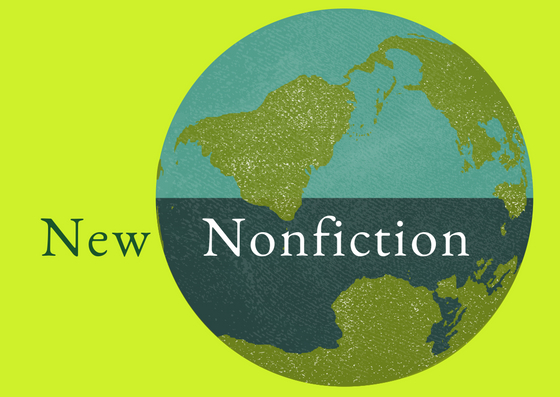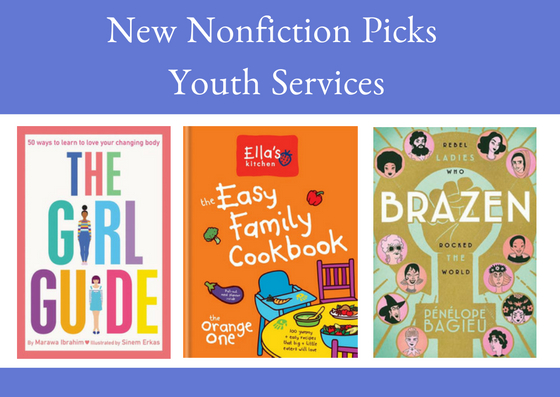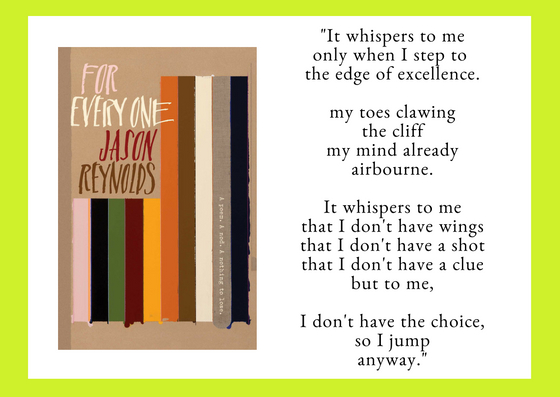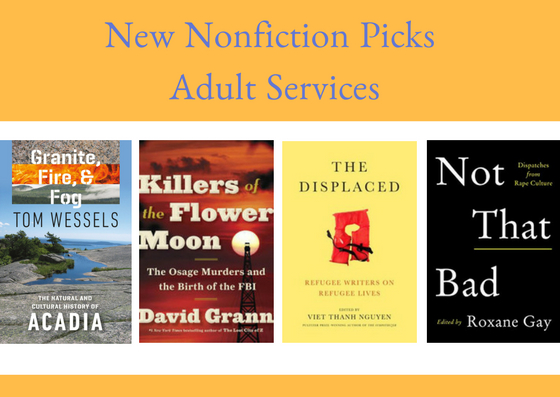May Staff Picks: Spring Into…
The joy of new books! Nonfiction is where it’s at this May, and plenty of unique and dynamic titles are already here. You can also log in to your library account and place holds on the new nonfiction books we have on order, including intriguing options like The Secret Life of Cows, The Right Words to Solve Every Parenting Dilemma, or Empress: The Astonishing Reign of Nur Jahan. Read on as a few of our Youth Services and Adult Services staff members share their own new nonfiction picks and reading ideas.
Children’s Services New Nonfiction
Carrie’s Pick
I love family cookbooks and this British import is sure to become a family favorite! With metric and imperial measurements, heavy binding, and wipeable pages, this book has it all. The Easy Family Cookbook is packed with recipes that children will actually enjoy and families can make together on a weeknight without a lot of fuss. Organized by mealtimes and full of inventive and family friendly recipes, but still well balanced and healthy, this cookbook will grow with your family. Recipes include lovely photographs to entice even the most picky eaters.
Research shows families that regularly eat dinner together benefit in myriad ways. From lower rates of obesity and eating disorders, to higher grade-point averages and self-esteem, the health benefits of family dinner are well documented. And family dinner conversation has even been shown to be a more potent vocabulary builder than reading! So why not start a new family tradition and let the kids pick a dinner or two a week to plan, cook, and clean up after? Everyone will benefit from the time spent together, the skills and confidence gained by learning to cook, and the magic that happens when families slow down and make eating well together a priority.
______________________________
Cindy’s Pick
The Girl Guide, 50 Ways to Learn to Love your Changing Body by Marawa Ibrahim is a lovely new non-fiction choice for middle-grade readers who may just be sashaying into puberty. Ibrahim’s very cheerful, friendly writing invites you to explore the many mysteries of puberty. Whether it is hair growing in new places, periods, embarrassment, meditation, exercise, body positivity or body parts, Ibrahim covers it all nicely.
It’s very inclusive of different body types and skin colors, without being pushy in any direction, which was refreshing to see. There are illustrations and photographs aplenty, including one showing Ibrahim’s own beautiful face: one half picturing an unrealistic, airbrushed side of her face, smoothed out with flawless makeup, while the other half remains unedited with her natural skin, acne and all.
What you come away with most strongly in this wonderful guide is that it is okay to be whoever you are, whatever you look like or feel like. If only we had all gone through Middle School with this book in our backpacks!
______________________________
Teen Services New Nonfiction
Kelley’s Pick
I LOVED For Everyone by Jason Reynolds, read it twice in one sitting, and want to buy it FOR EVERYONE.
Harper’s Pick
Brazen: Rebel Ladies Who Rocked the World by Pénélope Bagieu is more than just another collection of women to admire. With art that is both cute and expressive without being overwhelming, Bagieu tells the stories of a diverse array of women. The depth of information on each is amazing, especially considering how each biography fits in just a few short pages. Brazen had me adding a number of names to my ‘cool people to learn more about’ list, including: Nzinga, Las Mariposas, Tove Jansson, Sonita Alizadeh, Mae Jemison, and so many more.
Adult Services New Nonfiction
Eileen’s Pick
I want to know everything. A little bit at a time. The Dewey decimal system is my map. Today I am making a beeline for 508.7414.
Granite, Fire, & Fog: the Natural and Cultural History of Acadia by Tom Wessels
We are anchored to a marvel of natural wonder that is our home address: Planet Earth. Acadia is a small slice of Earth’s slow cooked story, a physical and eventually an ethnic amalgam of the past and present, with a whiff of the inevitable yet to come right in our own backyard. Wessels steps onto the path that Acadia has travelled for billennia, wending his way through the fantastic evolution of a place, to my mind rivalling the most unbelievable fiction as it roiled, boiled, compressed, rose up, sparked life.
On my second time reading Granite, Fog, & Fire, I again am enamored of the emotionally grounding nature of bedrock and what carves and covers it. To wit: lichens, mosses, glacial striations, igneous intrusions, crevice communities and such like amazements. Wondering what defines a bog versus a fen? Look no further than page 44, although I cannot imagine stopping there. You’ll not have met wind as sculptor or the travails of the Wabanaki who summered in Acadia for over 100 generations of regenerative lifestyle or the paper birch’s role as a “canary in the coal mine” of climate change… so many things I didn’t think to wonder about before reading Wessels’ gem. It is eminently accessible, written by a devoted fan of Acadia who is also a professor of ecology at Antioch University of New England, part guide, part history book, all engaging.
Did I mention that there is a glossary? I do love a good glossary!
Nonfiction has inspired and informed me, sometimes improved me, occasionally outed me as inept. I have lamented my neck with Nora Ephron, cooked vegetarian for everyone with Deborah Madison to guide me, and slept with a helmet for my pillow in the Pacific theater ‘long side Robert Leckie. DIY. Travel guides. Philosophy and religion. It’s all there, a smorgasbord that will feed me forever. I am ravenous and will not be satisfied anytime soon.
So, I keep on keepin’ on, trolling the stacks for books to fill the huge gaps in what I know, exploring new territory, reexamining old ways of thinking, and sometimes prying open my wallet to buy something that speaks to me, like Granite, Fire, & Fog.
Thank you, Mr Wessels.
______________________________
Jessie’s Pick
More than just a true crime book, Michelle McNamara chronicles her obsession with one of America’s most horrific unsolved crime sprees as she delves deeply into the case of the Golden State Killer in I’ll Be Gone in the Dark. Sadly, the author died suddenly before the book was finished. Her widower, actor Patton Oswalt, enlisted some of McNamara’s colleagues to complete her work using her extensive notes. McNamara’s respect for the victims is clear, and her confidence that the crimes would someday be solved shines through the deeply disturbing subject of her research: last month, two years after McNamara’s death, a suspect was finally apprehended.
______________________________
Brandie’s Pick
“History is a merciless judge. It lays bare our tragic blunders and foolish missteps and exposes our most intimate secrets, wielding the power of hindsight like an arrogant detective who seems to know the end of the mystery from the onset.”
I’d heard a lot of buzz about David Grann’s Killers of the Flower Moon—a 2017 finalist for the National Book Award in Nonfiction—but I don’t generally read from the 360s. Then Now Read This, a book club from PBS NewsHour and the New York Times, chose it as the book club pick for February. I’d committed to reading all the books they selected this year so I had to read it. I appreciate book clubs for so many reasons—but mostly because they get me to read outside of my comfort zone. This is a perfect example of a book I’d never have picked up on my own, but I’m so glad I read it.
Killers of the Flower Moon is a well-documented narrative of conspiracy, small-town corruption, and the mysterious murders of wealthy members of the Osage Nation in Osage County, Oklahoma, in the 1920s after oil was discovered on their land. Newspapers described the increasing number of unsolved murders as the “Reign of Terror,” and local law enforcement couldn’t be trusted to solve the case or help the Osage Nation.
The Federal Bureau of Investigation was created by Theodore Roosevelt in 1908: by the 1920s, though, it was still relatively small, with only a few hundred agents and a handful of offices around the country. Many agents, known for bending laws and getting cozy with criminals, were not to be trusted. The Department of Justice, Grann writes, “had become known as the Department of Easy Virtue.” J. Edgar Hoover was appointed director in 1924 and the Osage murders were to be Hoover’s first significant test of the new F.B.I.’s abilities.
Lies, greed, murder, cover-ups…this gripping true crime tale reads more like fiction than nonfiction. Grann is an extraordinary writer and really pulls you in from the first page. I don’t want to give too much away: there is so much to be discovered from all the twists and turns. It especially felt important to learn more about the Osage Nation as well as this dark piece of history. I highly recommend this read—check out the print version or you will miss all the fascinating pictures pertaining to this history.
______________________________
Hazel’s Pick
The Displaced: Refugee Writers on Refugee Lives edited by Viet Thanh Nguyen
“When it comes to justice, it does not matter whether those in a host country think they have no obligation to refugees. Keeping people in a refugee camp is punishing people who have committed no crime except trying to save their own lives and the lives of their loved ones.”
In less than 200 pages, Nguyen has compiled a series of brave and moving pieces from seventeen different refugee writers. Their accounts span widely across both time and place—from post-World War II Ukraine, to 1970s Chile under Pinochet, to Mugabe’s thirty-year presidency over Zimbabwe. These authors’ voices and their reasons for writing are as varied as their countries of origin, and the result is a timely and necessary collection that aches, endures, and reaches for home.
______________________________
Elizabeth’s Pick
Powerful writing and profound responses to assault, harassment, and abuse make up the personal essays in the new collection Not That Bad: Dispatches from Rape Culture, edited by Roxane Gay with writing from Samhita Mukhopadhyay, Miriam Zoila Pérez, Brandon Taylor, and a host of other contributors. Many share personal experiences and impact. Together they also call out culpability on individual and institutional levels, challenge the toxic culture they reveal, and get to the roots of systemic violence and aggression, underscoring the need for more widespread accountability of criminal actions as well as meaningful social change of the cultural norms and behaviors that cause lasting harm.
As Nora Salem writes in “The Life Ruiner,” her essay in this collection: “I’m writing this for the other girls, some of whom may be in my family. The boys, too. I’m writing this for my friend who told me to blame myself…Like all the writers I read, I’m writing to prove I exist. The Life Ruiner alone didn’t ruin me. The world that made him did—the place that continues to manufacture replicas of him and continues to create the circumstances in which he and his replicas thrive. What is there to do about that?”
______________________________
Nate’s Pick
As someone who has both struggled with and been intrigued by William Vollman’s fictional works, his nonfiction has offered slightly more grounded opportunities to explore his writing. Though not a practice in brevity, his newest undertaking, No Immediate Danger: Volume One of Carbon Ideologies presents a history of climate change, including major causes and a commentary on challenges associated with tackling the issue; it also explores the Fukushima nuclear disaster and Vollman’s travels in Japan. From the author of books dedicated to the ethics of violence and poverty, I expect a comprehensive perspective complimented by thoughtful social commentary.
______________________________
As ever, thanks for reading. For more ideas, you can always explore new additions to the library’s collections on our website here. Or try filling out our Your Next (Great!) Read form here, briefly tell us what you like to read and what you’re in the mood to read next, and you’ll receive a book list of personalized reading ideas and suggestions created for you by our Reader’s Advisory staff.
posted: , by Elizabethtags: Library Collections | Recommended Reads | Adults | Readers Writers




